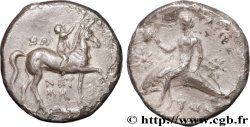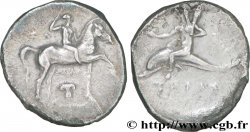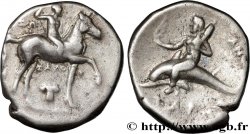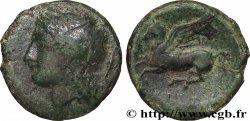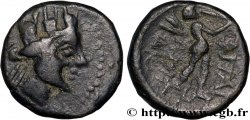Live auction - bgr_937036 - CALABRIA - TARAS Nomos ou didrachme
You must signin and be an approved bidder to bid, LOGIN TO BID. Accounts are subject to approval and the approval process takes place within 48 hours. Do not wait until the day a sale closes to register. Clicking on "BID" constitutes acceptance of the terms of use of cgb.fr private live auctions.
Bids must be placed in whole Euro amounts only. The sale will start closing at the time stated on the item description; any bids received at the site after the closing time will not be executed. Transmission times may vary and bids could be rejected if you wait until the last second. For further information check the Live auction FAQ
All winning bids are subject to a 18% buyer’s fee.
All winning bids are subject to a 18% buyer’s fee.
| Estimate : | 850 € |
| Price : | 480 € |
| Maximum bid : | 510 € |
| End of the sale : | 24 September 2024 14:00:40 |
| bidders : | 2 bidders |
Type : Nomos ou didrachme
Date: c. 275 AC.
Mint name / Town : Tarente, Calabre
Metal : silver
Diameter : 20,5 mm
Orientation dies : 12 h.
Weight : 6,39 g.
Coments on the condition:
Superbe exemplaire sur un flan bien centré des deux côtés. Joli revers finement détaillé. Patine grise avec des reflets bleutés et dorés
Catalogue references :
Obverse
Obverse description : Cavalier nu passant à droite, se couronnant lui-même ; entre les jambes du cheval, le chapiteau d’une colonne ionique.
Obverse legend : SW/ IALO
Reverse
Reverse description : Taras nu, chevauchant un dauphin à gauche, tenant un aplustre de la main droite et une quenouille de la main gauche.
Reverse legend : TARAS/ ANQ
Reverse translation : (Tarente).
Commentary
C’est l’un des nomos les plus courants pour le monnayage de Tarente pour cette période. L’aplustre que tient Taras au revers est un symbole maritime. En revanche, la présence de la quenouille reste plus énigmatique et fait peut-être référence à l’une des nombreuses activités de la cité.
It is one of the most common nomos for Taranto coinage for this period. The apluster held by Taras on the reverse is a maritime symbol. On the other hand, the presence of the distaff remains more enigmatic and perhaps refers to one of the many activities of the city
It is one of the most common nomos for Taranto coinage for this period. The apluster held by Taras on the reverse is a maritime symbol. On the other hand, the presence of the distaff remains more enigmatic and perhaps refers to one of the many activities of the city








 Report a mistake
Report a mistake Print the page
Print the page Share my selection
Share my selection Ask a question
Ask a question Consign / sell
Consign / sell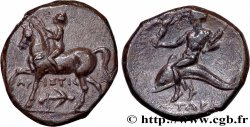
 Full data
Full data